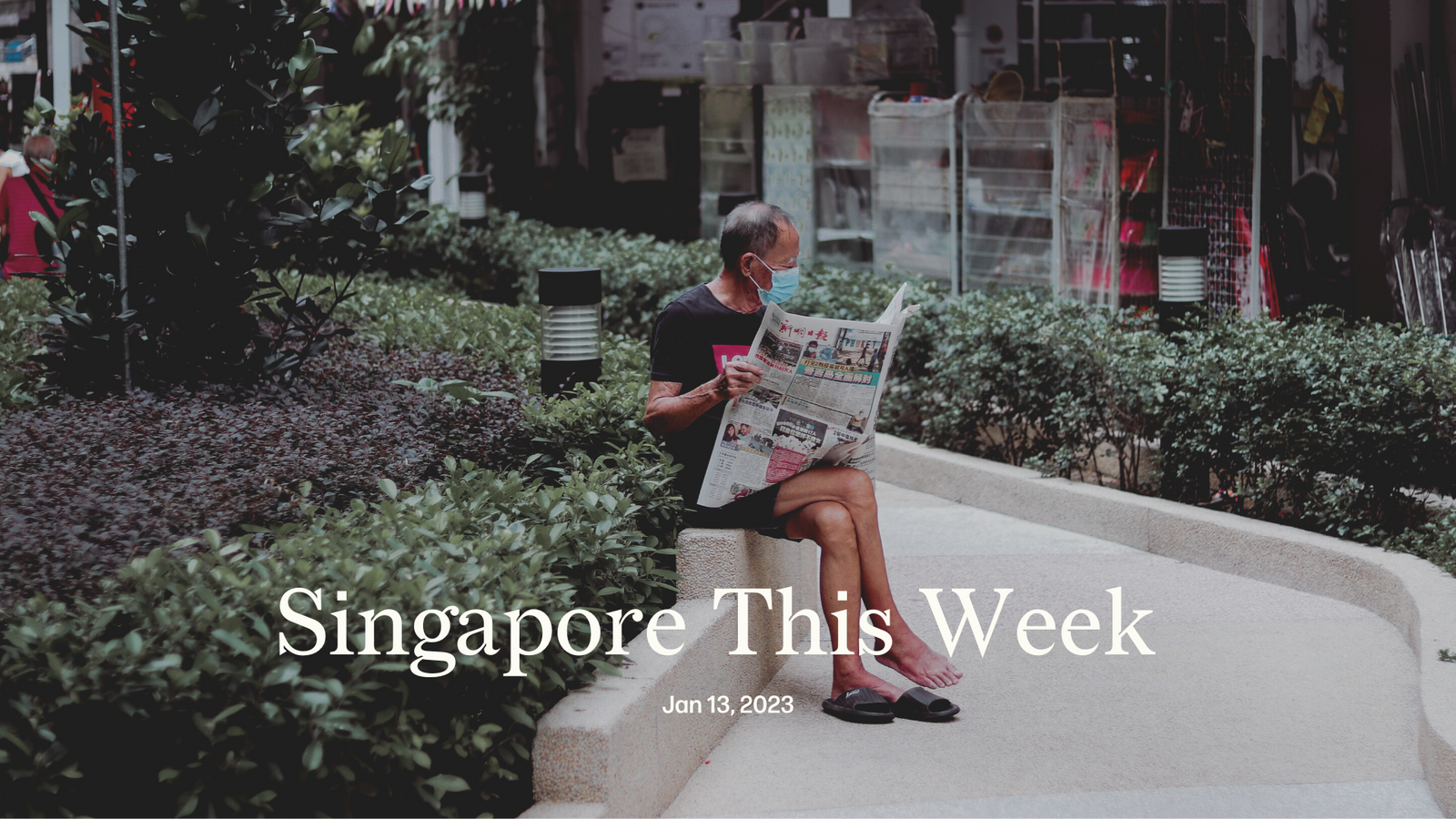Politics: Independent media and the opposition again show their value to Singapore
Singaporeans occasionally get glimpses into the crucial roles played by non-establishment actors: one thinks of The Online Citizen helping to expose the Brompton Bicycle scandal in 2012 and Pritam Singh of the Workers’ Party pushing the government to reveal more granular employment data regarding citizens and non-citizens in 2020. Yet rarely does it happen in such quick succession. On Sunday (January 8th), Wake Up Singapore broke the story that three senior executives had left SPH Media Trust (SMT) because of discrepancies in circulation numbers. This forced SMT into finally making its own admission on Monday, over two weeks after the executives left, and possibly months after the potential fraud was first discovered (see below). Also on Monday, Leong Mun Wai of the Progress Singapore Party (PSP) asked a parliamentary question that forced the government to reveal that it's spending well over S$200m annually on advertising, an astonishing amount for a small population (see below). Finally, the PSP’s Hazel Poa also asked a question that forced the government to reveal that 42 Singaporeans died and 52 suffered permanent disabilities while performing national service over the past 20 years. Most other democracies, including Israel and the UK, make publicly available such information about lives lost. Singapore does not. The next time the ruling People’s Action Party (PAP) tries to smear independent media and the opposition, you should ask yourself why.
Politics: How you pay for your own brainwashing
One way the PAP controls narratives and keeps media outfits onside is through advertising spending. Before the internet, this was mostly through the mainstream media. Yet, in recent years its influence has reached deep into the hearts (and pockets) of influencers like Michelle Chong and outfits like SGAG. They never fully and clearly disclose their commercial relationships with the government—SGAG gets by with an inconspicuous #sp footnote that doesn’t name sponsor—so you are effectively shown propaganda dressed as commentary and paid for by your tax dollars. It’s similar to other illiberal democracies such as Modi’s India, where friendly media players are offered access and juicy contracts. Some call the broader phenomenon “market-based authoritarianism”. This week, a parliamentary question from the opposition compelled the Singapore government to reveal that it spends well over S$200m annually on advertising. The government incredibly refused to answer the sub-question on electronic-media breakdown, such as spending on TikTok, demonstrating the limits of Parliament. Australia, a country of 25m people, spends just over double that, which has led to disgruntlement there. (Singapore spends some 2.5 times as much as Australia on a per capita basis.) Of course, some of this spending is on vital communication that is in the public interest, for example pandemic-related messaging. Much else, including Chong’s Ah Lian helping the government sell its Protection from Online Falsehoods and Manipulation Act (POFMA), is just plain deplorable. And you probably footed her bill.
Business: SPH Media Trust in crisis
Following a scoop in Wake Up Singapore, SMT, publisher of The Straits Times, Lianhe Zaobao and other major dailies, announced that it has been lying about its circulation numbers, inflating them by 85,000-95,000, or 10-12 percent. It did so through methods both shocking and farcical: double counting of subscriptions; injecting a project account with funding to purchase fictitious circulation; the use of arbitrary figures; and the printing of extra copies that were counted and then promptly destroyed. SMT was spun off from listed Singapore Press Holdings in December 2021 to become a non-profit entity. The internal review covered the period September 2020 to March 2022. This means that any potential fraud may have existed while SMT was still part of a publicly listed entity; Singapore Exchange is reviewing the incident for possible market manipulation. Worse, the government just pledged to give SMT up to S$900m over five years. Many Singaporeans see all this as a public bailout of a failed media entity—one whose leaders each earn over S$1m a year. These latest revelations come at a time when many are feeling the pain from rising inflation and the recent GST hike. The group’s editor-in-chief said that “more things may come out”. Among other points of concern: how high up the ladder the rot goes, how long ago executives knew about this; whether any crimes were committed; and how exactly the PAP is going to talk its way out of this one. “Readership and trust in SMT’s journalism continue to be high,” Josephine Teo, communications and information minister, said last year when defending the S$900m infusion. Sorry, JoTeo. Readership was fudged. And trust has never been lower.
Society: Out of prison and into the workplace
As of May last year, 2,300 ex-offenders had been hired via the Jobs Growth Incentive (JGI) scheme. The government introduced it in August 2020 to encourage companies to hire local and marginalised workers (later extended to people with disabilities and ex-offenders). Many work in the construction, food services, logistics and retail sectors. In its fifth phase, employers who hire workers under the scheme from October 2022 to March 2023 will be reimbursed for 20 percent of their first S$6,000 of gross monthly wages. One of the main obstacles ex-offenders face when reintegrating into society is employability—due to distrust and concerns about reoffending in the workplace. National programmes like JGI and the Yellow Ribbon Project strive to reduce stigma and discrimination towards former prisoners. Every year, more than 9,000 ex-offenders complete their sentences and are released from prisons and drug rehabilitation centres. Those who re-enter the community benefit from aftercare support in finding accommodation, rekindling bonds with family, rebuilding social networks, and keeping their jobs. A more inclusive and forgiving society, financial incentives, and a manpower shortage due to Covid might have made companies more willing to hire ex-inmates, which in turn has contributed to keeping the recidivism rate at its lowest point in 30 years. Directing more resources to vulnerable communities might also help those driven to crime by circumstance stay out of jail in the first place.
Society: Spare the rod, spoil the old man
Whether you agree with corporal punishment or not, the current law in Singapore prevents men over 50 years old from being caned. This has meant that in the past three years, about 15 percent of male offenders arrested for serious sexual and hurt offences (rape, sexual assault, sexual penetration of minors and culpable homicide) were spared the rod. In a written parliamentary reply, K Shanmugam, law and home affairs minister, added that there appeared no upward trend of individuals in their 40s and older committing such crimes. Last month, Halimah Yacob, Singapore’s president, wrote on Facebook, “Rapists should not be spared the cane just because they are fifty years old.” Her vexation might be about a matter of fairness and better protection of children from sexual predators. But does inflicting the cane on rapists older than 50 years old necessarily resolve the problem? In many cases, the offences happened years before they were reported, or sentences are meted out after the offender turns 50. Also, if caning was really such a strong deterrent, would it not discourage sexual offenders from repeating their crimes? Perhaps the discussion to be had is about banning caning (including in school and at home), and implementing more effective, non-violent ways to keep our children safe or disciplined that aren’t physically and psychologically traumatising.
Arts: Gone too soon
In a week when Singapore lost several elderly luminaries—architect William SW Lim, entrepreneur Sim Wong Hoo and rugby legend Yee Teck Peng—we also mourn a younger one. Actor and director Timothy Nga passed away at 49. Nga was a fixture in the Singaporean theatre scene, having worked with companies like Singapore Repertory Theatre, Theatreworks, and Checkpoint Theatre. He worked in film and television too, most recently appearing in Anthony Chen’s “Wet Season” (2019) and the Mediacorp drama “This Land Is Mine” (2021). Nga was also an inaugural ambassador for Pink Dot in 2009.
Arts: Huayi
Huayi, the Esplanade’s annual Chinese Festival of Arts, is back for the Year of the Rabbit. For the first time since the pandemic began, audiences can look forward to international acts headlining the festival. Taiwan’s world-renowned contemporary dance company, Cloud Gate Dance Theatre, returns to Singapore with their production 13 Tongues. It pays tribute to Bangka, one of the oldest districts of Taipei, with a dance recreation of the bustling streets on which Cheng Tsung-lung, artistic director, grew up. Huayi is also presenting a trio of Taiwanese acts—Elephant Gym, ANPU and Accusefive—in their Chinese music showcase in::music. The Festival’s two-week programme also features performances from Hong Kong, Malaysia and Singapore. It runs from January 27th to February 5th. Tickets are available via Sistic.
Arts: Alex Blake Charlie Sessions
The Alex Blake Charlie Sessions have returned for the first time since their 2019 debut. The female-led music festival had previously gone on hiatus during the pandemic. No longer a one day festival, this edition will stretch over five days and feature screenings of films made by women, a pop-up book cafe with titles from female authors, an art lane, and a series of pre-festival DJ nights. These programmes will culminate in a day-long music event at the Pasir Panjang Power Station. The line-up so far includes American singer-songwriter Soccer Mommy, Malaysian electronic music producer rEmPiT g0dDe$$, and Singaporean alt-rock trio Coming Up Roses to name a few. The Alex Blake Charlie Sessions are on from February 21st-24th. Early bird tickets are available now.
History weekly by Faris Joraimi
Indonesia’s president, Joko Widodo (Jokowi) this week expressed “regret” over state-sanctioned violence and persecution that took place in past decades. In a speech delivered at Jakarta’s Istana Merdeka on Wednesday, a dozen incidents were raised, including the notorious 1965 mass purge of “communists” that brought down Sukarno and began the dictatorship of Suharto. A source of enduring national trauma in Indonesia, the military-led campaign destroyed the country’s left-wing movement and the PKI, which was then the world’s largest non-governing communist party. Estimates place the death toll between 500,000 and a million people. Officially, the murderous coup is remembered as a heroic triumph by Suharto over communism, and public discussion of the subject is discouraged. (Sounds familiar.) Historians largely agree that the CIA actively supported the Indonesian army’s killing spree, by providing hit-lists to local death squads. An outspoken enemy of Western imperialism and backed by the PKI, Sukarno was a natural target for the US and its allies. American involvement was part of a global campaign of Western sabotage and aggression against the Third World during the Cold War. Other incidents highlighted by Jokowi include the disappearance of student protestors in 1998, anti-Chinese pogroms, and crackdowns in separatist West Papua. Such official acknowledgements of state harm can be powerful gestures, but it’s not clear what and how any reparations will be made. Calling for judicial resolution, Indonesian human rights groups think the statement is insufficient.
Tech: Twitter’s dubious future under Musk
Twitter's layoffs continue to make headlines, with reports indicating that at least a dozen more cuts have been made in the social media giant's Dublin and Singapore offices. The news comes as no surprise, as new owner Elon Musk's tenure at Twitter has been plagued by incessant layoffs and disruptive changes. This time round, the content moderation team has taken the hardest hit, with workers in charge of handling misinformation, hate speech, global content, and harassment among those let go. Last December, it was reported that the content moderation team had already been whittled down to 10 from the previous number of 20 to 30 globally. Twitter had also dissolved the Trust and Safety Council it formed in 2016, which comprised volunteers such as Eirliani Abdul Rahman, a Singaporean child safety activist. All this not only deepens the wound for the site's already limited content moderation team but also sets a gloomy cloud for the future of Twitter's content chamber.
Tech: Can machines diagnose cancer?
Stories of how a cancer diagnosis came a stage too late are heartbreaking. A quick and accurate diagnosis can often mean the difference between life and death. Qritive, a Singapore-based healthcare start-up, is making waves in the industry with its innovative approach to diagnostics. By using AI-powered solutions to provide fast and accurate interpretations of whole-slide images used in pathology, Qritive is reducing treatment time and increasing accuracy for cancer care. Whole-slide images are photos of tissue samples like skin, brain, or lung tissue that have been stained and viewed under a microscope. Recently, the company raised US$7.5m (S$9.9m) in a funding round led by MassMutual Ventures and joined by SEEDS Capital and Exfinity ventures. They last raised an undisclosed amount from Entrepreneur First in 2018. Some 70 percent of pathologists are in just 10 countries, leaving nearly half the global population without adequate access to essential diagnostic services. Digital pathology could plug the gap and Qritive is hoping to lead the way.
Tech: Grabbing even more
If you thought the reign of Singapore-based, ride-hailing giant Grab in South-east Asia couldn't possibly expand any further, think again! The ride-hailing giant just announced a potentially game-changing partnership with ZaloPay, the financial services arm of internet firm VNG, making it their latest cashless solution in Vietnam. Grab Vietnam’s transportation service, as well as food, grocery and parcel deliveries, can now be paid using ZaloPay, a standalone mobile payment app with partnerships from Visa, Mastercard, and 39 domestic banks. Not only that but also, it is integrated into Zalo, Vietnam’s version of WeChat with 71m users in the country as of July 2022. This gives Grab access to a large pool of users from the app. Grab alumni are also spreading their wings across the region. Zoomcar, a car-sharing firm, recently appointed Ashu Singhal, previously the head of the fulfilment and marketplace team at Grab, as its new chief technology and product officer. Zoomcar hopes to dominate the car-sharing industry in Egypt, India and South-east Asia.
Tech: Licensing the financial disruptors
Singapore-based fintech firm, PayerMax, has been granted a major payment institution (MPI) licence by the Monetary Authority of Singapore (MAS). This licence allows PayerMax's unit, Int Payment Technology Pte. Ltd, to offer an array of regulated payment options to local customers, including cross-border and domestic money transfers, as well as merchant acquisition services. This licence is pivotal because it enables PayerMax to expand its footprint in South-east Asia, which is seeing a rapid shift towards cashless payments, projected to reach 623m consumers by 2030. PayerMax intends to work with the private and public sectors to bolster the payment infrastructure for firms in the e-commerce, gaming, and entertainment spaces, and cater to over 350 local payment methods across Latin America, the Middle East, North Africa, South Asia, and South-east Asia.
If you enjoy Jom’s work, do get a paid subscription today to support independent journalism in Singapore.








